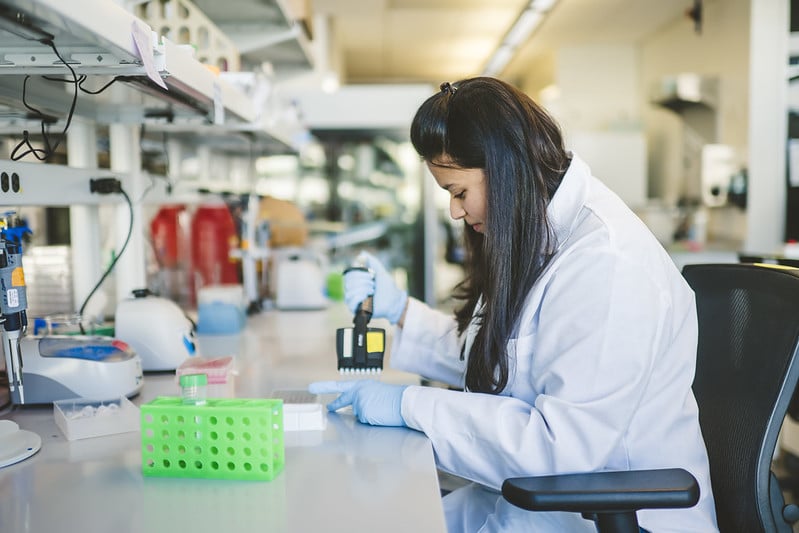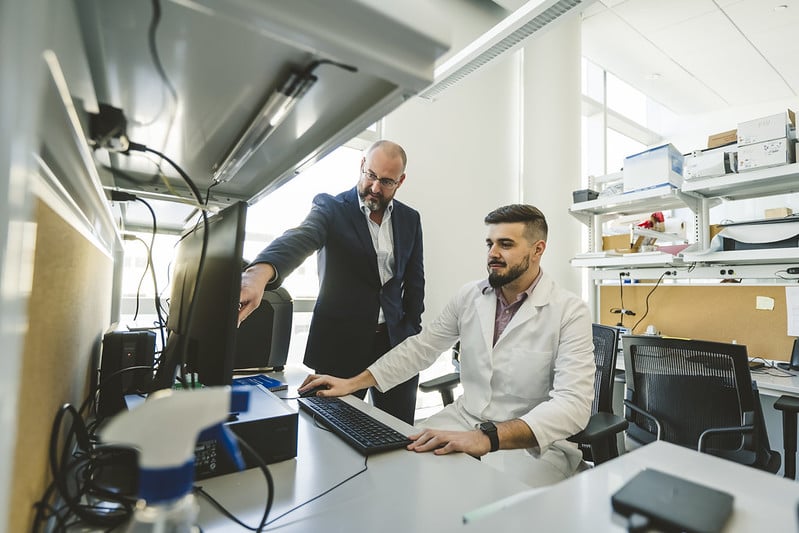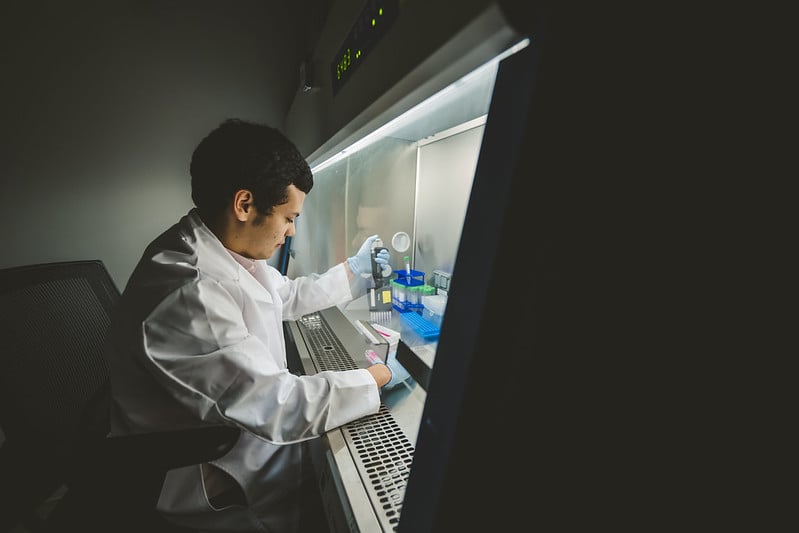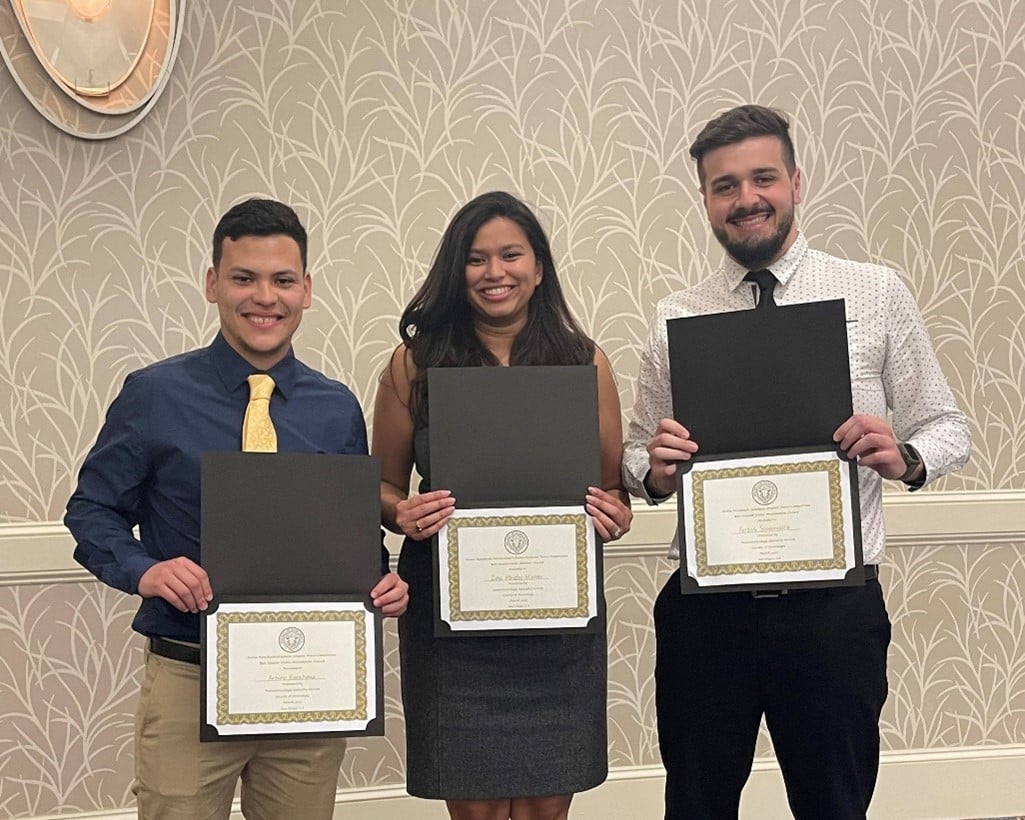A post-doc and two Ph.D. students from the Robert Stempel College of Public Health & Social Work at Florida International University won awards from the Neurotoxicology Specialty Section for their presentations during the 2022 Society of Toxicology Annual Meeting that took place March 27-31, 2022, in San Diego, California.
Post-doc Isha Mhatre-Winters and Ph.D. students Ferass Sammoura, and Arturo Barahona presented on Alzheimer’s disease research being conducted in the lab of Dr. Jason R. Richardson, Associate Dean of Research and Professor in the Department of Environmental Health Sciences.
“I am extremely proud of this amazing group of students and their efforts in working to understand genetic and environmental contributors to neurological disorders like Alzheimer’s disease,” said Dr. Richardson. “The hard work they put into researching and preparing for this year’s annual meeting truly paid off. I look forward to seeing their important and continued contributions to the field of toxicology as they progress in their careers. I am also extremely proud of all of the students and postdoctoral fellows in the Department and extremely grateful for the collaborative nature and dedication of our faculty and their contributions to the training of all of our students.”
“Congratulations to Isha, Ferass and Arturo for their outstanding presentations, as well as to Dr. Jason Richardson for his guidance and mentorship,” said Tomás R. Guilarte, Dean of Stempel College. “I am proud of them for getting recognized for their impactful work, as well as of all the students who presented abstracts and posters at the annual meeting this year.”
Isha Mhatre-Winters won first place in the Best Postdoctoral Abstract Award competition, and first place in the Dr. Dharm Singh Postdoctoral Fellow Best Abstract Award competition from the Association of Scientists of Indian Origin at the Society of Toxicology
 Post-doc Isha Mhatre-Winters in Dr. Richardson's lab
Post-doc Isha Mhatre-Winters in Dr. Richardson's lab
What did you present at the annual meeting?
“The research focused on neuroinflammation in Alzheimer’s disease (AD) and investigating the mechanisms involved in the progression of the disease. The APOE4 genotype is the strongest genetic risk factor for Alzheimer’s disease (AD), and females have an increased risk of developing AD at a younger age which is modified by the APOE genotype. As the incidence and cost of treating AD continue to rise dramatically, there is a desperate need to understand the interactions between non-modifiable risk factors such as sex and genotype on inflammatory responses for therapeutic interventions.”
What do you hope your research will help accomplish?
"I hope that my research will aid in understanding the risk for AD from a more relevant standpoint and ultimately lead to an impact for patients."
How does it feel to win this award?
“I am very honored and thankful to the Society of Toxicology and NTSS. I am deeply grateful to Dr. Jason R. Richardson for his unwavering support and guidance. This award recognizes the efforts of my lab mates, colleagues and mentors for their unceasing encouragement and support.”
Ferass Sammoura won first place in the Neurotoxicology Specialty Section Best Student Poster Award competition, and received the Best Student Abstract Award from the SOT Arab Toxicologists Association Special Interest Group
 Ph.D. student Ferass Sammoura with Dr. Jason Richardson
Ph.D. student Ferass Sammoura with Dr. Jason Richardson
Ferass Sammoura, whose story was recently featured in FIU News, presented research on how the pesticide DDE — the substance produced when DDT metabolizes — impacts the amyloid pathway, a hallmark of Alzheimer’s disease. “DDE has long been thought to be inactive and not to harm people,” Sammoura says. “What we’re finding is that at the very same, very low concentrations it can induce the same effects as DDT on the amyloid pathway.”
How does it feel to win this award?“I was ecstatic to see my lab mates win their awards, and I was pleasantly surprised to see my name! The award means so much to me in terms of conveying the research to other members of the Neurotoxicology community, and really speaks to the impact that our work has in the field. I am beyond honored to be recognized for my award.”
Arturo Barahona won second place in the Neurotoxicology Specialty Section Best Student Poster Award competition
 Arturo Barahona in Dr. Richardson's lab
Arturo Barahona in Dr. Richardson's lab
What did you present at the annual meeting?“I presented on the effects of the organochlorine pesticide DDT and its metabolite DDE on Amyloid Beta pathology in the 5xFAD mouse model of Alzheimer's disease. We are looking at the association between pesticides DDT/DDE and Alzheimer’s disease. Alzheimer’s disease is a debilitating neurodegenerative disease for which there is yet no cure. We are trying to understand how exposure to this pesticide, which is still found in the environment, increases our risk for developing the disease.”
What do you hope your research will help accomplish?
“We hope to use our findings to help uncover the etiology of Alzheimer’s disease.”
How does it feel to win this award?
“I feel honored and privileged to have received this award. I would like to give a special thanks to my PI and my lab mates without whose support I would not be here. This award is a collective achievement and reflects our lab’s collaborative spirit and our ability to push one another. SOT ‘22 has been an unforgettable experience, and I can’t wait for the next one.”

